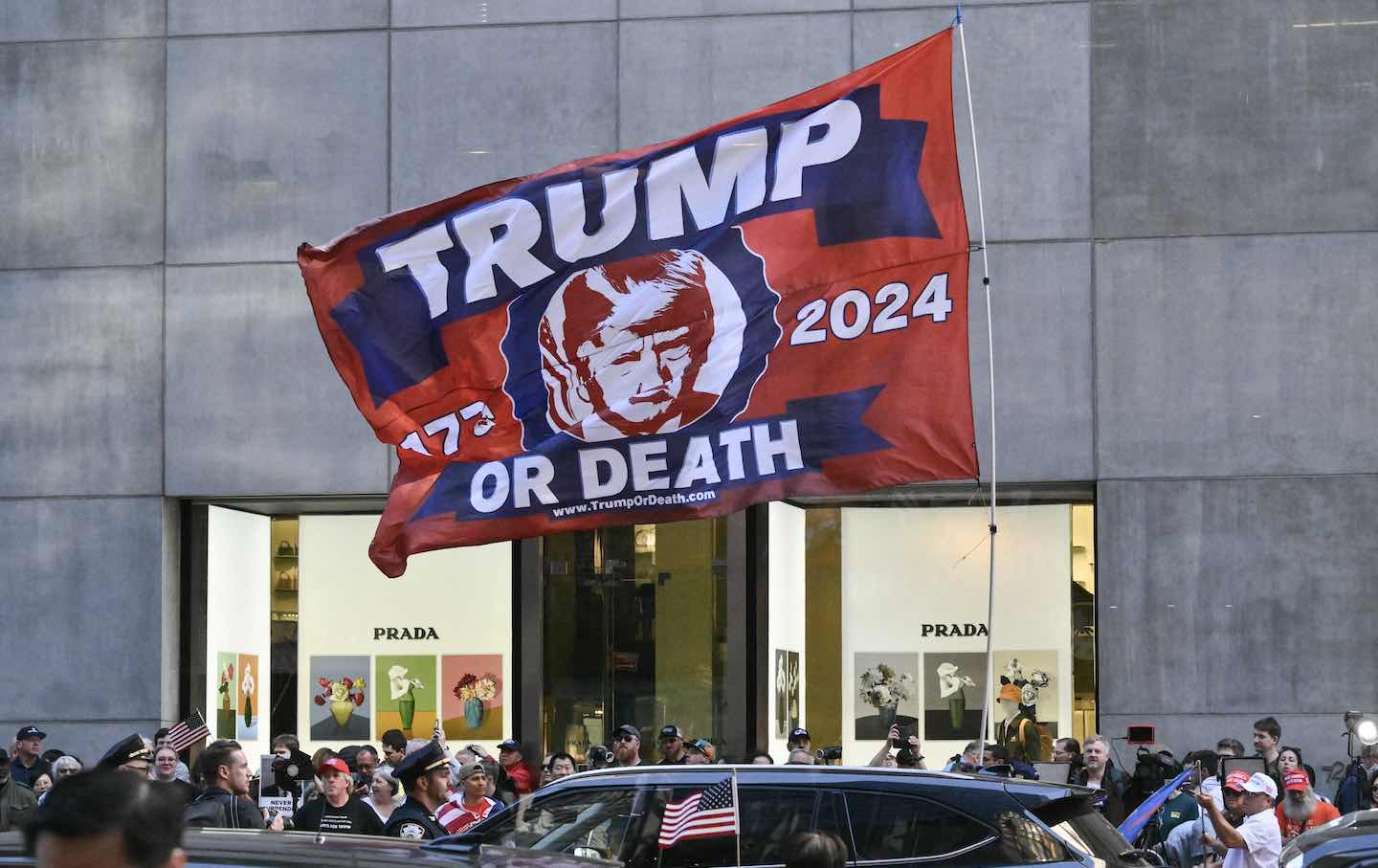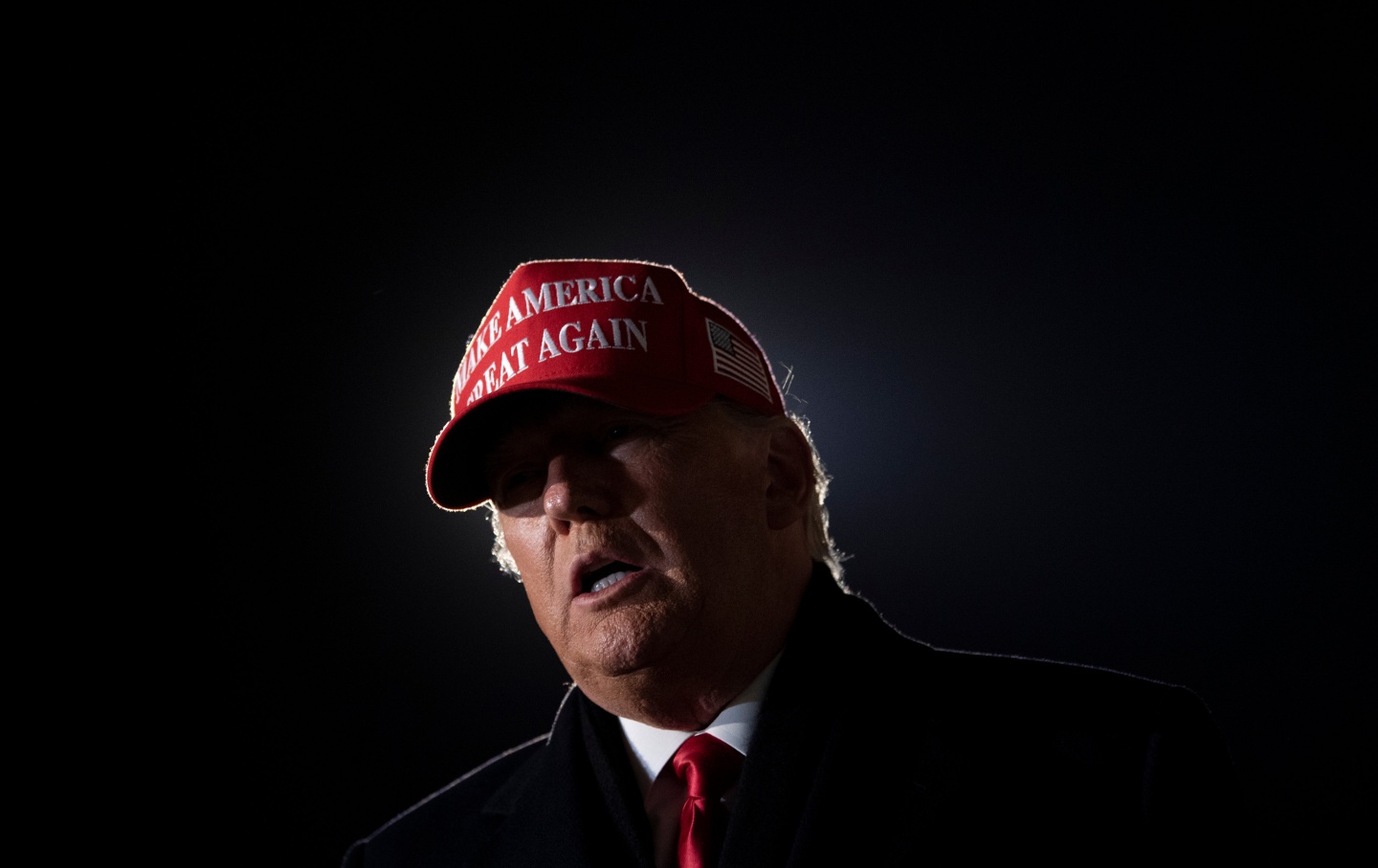Project 2025’s Guide to Subverting Democracy
A second Trump administration could weaponize existing government agencies to dismantle democracy itself.

This article is part of “Project 2025: The Plot Against America,” a Nation special issue devoted to unpacking the right’s vast and chilling program for a second Trump term.
Donald Trump has made no secret of his determination to govern as a “dictator” if he regains the presidency, and that’s got his critics warning that his reelection would spell the end of democracy. But Trump and his allies are too smart to go full Kim Jong Un. Rather, the former president’s enthusiasm for the authoritarian regimes of Russia’s Vladimir Putin, Turkey’s Tayyip Erdoğan, and Hungary’s Viktor Orbán suggests the models he would build on: managing elections to benefit himself and his Republican allies; gutting public broadcasting and constraining press freedom; and undermining civil society. Trump, who famously demanded that the results of Georgia’s 2020 presidential voting be “recalculated” to give him a win, wants the trappings of democracy without the reality of electoral consequences. That’s what propaganda experts Edward Herman and Frank Brodhead once described as “demonstration elections,” in which, instead of actual contests, wins are assured for the authoritarians who control the machinery of democracy.
The outline for such a scenario emerges from a thorough reading of Project 2025’s Mandate for Leadership, which specifically proposes a Trump-friendly recalculation of the systems that sustain American democracy. The strategy for establishing an American version of Orbán’s “illiberal democracy” is not spelled out in any particular chapter of Mandate. Rather, it is woven throughout the whole of the document, with key elements appearing in the chapters on reworking the Department of Homeland Security (DHS), the Federal Communications Commission (FCC), and the Federal Election Commission (FEC). In the section on the DHS, for instance, there’s a plan to eliminate the ability of the agency that monitors election security to prevent the spread of disinformation about voting and vote counting.
How serious a threat to democracy would that pose? Think back to November 2020, when Trump was developing his Big Lie about the election he’d just lost. Trump’s false assertion that the election had been characterized by “massive improprieties and fraud” was tripped up by Chris Krebs, who served as director of the Cybersecurity and Infrastructure Security Agency (CISA) in the DHS.
The Republican appointee and his team had established a 24/7 “war room” to work with officials across the country to monitor threats to the security and integrity of the election. The operation was so meticulous that Krebs could boldly announce after the voting was finished: “America, we have confidence in the security of your vote, you should, too.” At the same time, his coordinating team declared, “The November 3rd election was the most secure in American history.” This infuriated Trump, who immediately fired the nation’s top election security official.
In Mandate’s chapter on the DHS, Ken Cuccinelli writes, “Of the utmost urgency is immediately ending CISA’s counter-mis/disinformation efforts. The federal government cannot be the arbiter of truth.” Cuccinelli previously complained that CISA “is a DHS component that the Left has weaponized to censor speech and affect elections.” As for the team that worked so successfully with Krebs to secure the 2020 election, the Project 2025 document declares that “the entirety of the CISA Cybersecurity Advisory Committee should be dismissed on Day One.” The potential impact? “It’s a way of emasculating the agency—that is, it prevents it from doing its job,” says Herb Lin, a cyber-policy and security scholar at Stanford’s Center for International Security and Cooperation.
This is just one way that Project 2025’s cabal of “experts” is scheming to thwart honest discourse about elections and democracy. A chapter on public broadcasting proposes to defund the Corporation for Public Broadcasting as part of a larger plan to upend NPR, PBS, and “other public broadcasters that benefit from CPB funding, including the even-further-to-the Left Pacifica Radio and American Public Media.” More destabilizing than the total funding cut that Project 2025 entertains is a parallel plan to end the status of NPR and Pacifica radio stations as “noncommercial education stations.” That could deny them their current channel numbers at the low end of the radio spectrum (88 to 92 FM)—a move that would open prime territory on the dial for the sort of religious programming that already claims roughly 42 percent of the airwaves that the FCC reserves for noncommercial broadcasting. And don’t imagine that the FCC would be in a position to write new rules that guard against the surrender of those airwaves to the Trump-aligned religious right.
In the words of Politico, Project 2025 seeks “to give the president complete power over quasi-independent agencies such as the Federal Communications Commission, which makes and enforces rules for television and internet companies that have been the bane of Trump’s political existence in the last few years.” As part of its focus on the agency, Project 2025 champions the abandonment of the FCC’s legacy as “a New Deal–era agency” and proposes “eliminating many of the heavy-handed FCC regulations that were adopted in an era when every technology operated in a silo. These include many of the FCC’s media ownership rules.” That’s a recipe for empowering media giants like the Sinclair Broadcast Group. In a 2019 article in the American Political Science Review, Gregory Martin and Josh McCrain determined that the “stations bought by Sinclair reduce coverage of local politics, increase national coverage and move the ideological tone of coverage in a conservative direction relative to other stations operating in the same market.” Sinclair already reaches 40 percent of American households via more than 180 stations, and when the group’s chair, David Smith, met with Trump in 2016, he said, “We are here to deliver your message.”
While project 2025 seeks to rewire the FCC to favor Trump’s allies, it also wants to lock in dysfunction at the Federal Election Commission, the agency that is supposed to govern campaign spending and fundraising. Established 50 years ago, the FEC has six members—three Republicans and three Democrats—who are charged with overseeing the integrity of federal election campaigns. In recent years, however, this even partisan divide has robbed the FEC of its ability to act because, as a group of former FEC employees working with the Campaign Legal Center explained, “three Commissioners of the same party, acting in concert, can leave the agency in a state of deadlock.” As the spending by outside groups on elections “has exponentially increased, foreign nationals and governments have willfully manipulated our elections, and coordination between super PACs and candidates has become commonplace,” the former employees noted. Yet “the FEC [has] deadlocked on enforcement matters more often than not, frequently refusing to even investigate alleged violations despite overwhelming publicly available information supporting them.”
One logical reform, supported by many Democrats, would reduce the number of FEC commissioners to five, with two Democrats, two Republicans, and an independent chair. Mandate’s chapter on the FEC rejects that reform, arguing that Trump and a Republican Congress must resist “efforts to impose a ‘nonpartisan’ or so-called ‘independent’ chair.” Instead, Project 2025 supports “removing the Federal Election Commission’s independent litigating authority”—a move that would render the agency even more toothless. In addition, it advocates a strategy that would direct the US attorney general to defend the FEC in circumstances in which citizens sue the agency to get it to enforce the law—an approach that would effectively block one of the last remaining avenues for addressing illegal electioneering.
This is all part of Project 2025’s broader vision for restructuring the Department of Justice so that it can be weaponized by a new Trump administration when it comes to election-related issues. In Mandate’s chapter on the Department of Justice, Gene P. Hamilton, a DOJ appointee under Trump, proposes reassigning responsibility for prosecuting election-related offenses from the department’s Civil Rights Division to its Criminal Division. Why? To ensure that Republican-generated claims about “fraudulent voter registration,” “mail-in ballot fraud,” and presumably the various targets of Trump’s Big Lie claims regarding the 2020 election are “appropriately investigated and prosecuted.”
Instead of focusing on voter suppression, the manipulation of election processes by domestic and foreign agents, and other genuine threats to democracy, Mandate for Leadership’s authors would have these agencies do the bidding of Trump and his MAGA movement. That’s a formula for giving Trump the authoritarian power he seeks—not through an explicit crushing of electoral democracy, but by “reforming” it in precisely the way that the nonpartisan group Protect Democracy warns is most dangerous.
“The biggest innovation of 21st-century authoritarians has been to maintain the facade of democratic elections while at the same time tilting the rules against their opponents,” the group explains in its report, The Authoritarian Playbook. “They do this by suppressing votes and biasing, distorting, falsifying, or even overturning the results—either through capturing the referees or by manipulating the electoral rules in their favor.”
The assault on democracy takes many forms and many names in countries around the world. In the United States, its name is Project 2025. But this assault is not a fait accompli. By incorporating a smart, aggressive critique of the Trumpian Mandate in all of their campaigning in 2024—thus ensuring that voters know the fate of democracy really is at stake—Trump’s foes can and must prevent this right-wing fever dream from becoming an American nightmare.
We cannot back down
We now confront a second Trump presidency.
There’s not a moment to lose. We must harness our fears, our grief, and yes, our anger, to resist the dangerous policies Donald Trump will unleash on our country. We rededicate ourselves to our role as journalists and writers of principle and conscience.
Today, we also steel ourselves for the fight ahead. It will demand a fearless spirit, an informed mind, wise analysis, and humane resistance. We face the enactment of Project 2025, a far-right supreme court, political authoritarianism, increasing inequality and record homelessness, a looming climate crisis, and conflicts abroad. The Nation will expose and propose, nurture investigative reporting, and stand together as a community to keep hope and possibility alive. The Nation’s work will continue—as it has in good and not-so-good times—to develop alternative ideas and visions, to deepen our mission of truth-telling and deep reporting, and to further solidarity in a nation divided.
Armed with a remarkable 160 years of bold, independent journalism, our mandate today remains the same as when abolitionists first founded The Nation—to uphold the principles of democracy and freedom, serve as a beacon through the darkest days of resistance, and to envision and struggle for a brighter future.
The day is dark, the forces arrayed are tenacious, but as the late Nation editorial board member Toni Morrison wrote “No! This is precisely the time when artists go to work. There is no time for despair, no place for self-pity, no need for silence, no room for fear. We speak, we write, we do language. That is how civilizations heal.”
I urge you to stand with The Nation and donate today.
Onwards,
Katrina vanden Heuvel
Editorial Director and Publisher, The Nation
More from The Nation

Sundays With Noel Sundays With Noel
Noel Parmentel was, according to his former lover and mentee, Joan Didion, the ‘outsider who lived by his ability to manipulate the inside.’

Bosses Are Retaliating Against Workers for Showing Solidarity With Palestinians Bosses Are Retaliating Against Workers for Showing Solidarity With Palestinians
Workers are losing their jobs and professional opportunities for expressing pro-Palestinian sentiment. Others are choosing to self-censor amid a climate of fear.

When It Comes to Public Health, We Need to Tap Into People, Not Pundits When It Comes to Public Health, We Need to Tap Into People, Not Pundits
The future of our health under Trump is going to be bleak. But the solution lies in our communities, not individual personalities.

Mr. Scarborough Goes to Mar-a-Lago Mr. Scarborough Goes to Mar-a-Lago
The hosts of Joe Biden’s favorite political talk show have quickly pivoted to kissing the ring of the incoming president.

Watching a Parallel Media Try to Make Trump the Big Sports Story Watching a Parallel Media Try to Make Trump the Big Sports Story
The president-elect did not dominate the world of sports this weekend, but Fox News and Internet tabloids are inventing new realities.

The First Amendment Will Suffer Under Trump The First Amendment Will Suffer Under Trump
Given what’s heading our way, we need a capacious view and robust defense of the First Amendment from all quarters.


